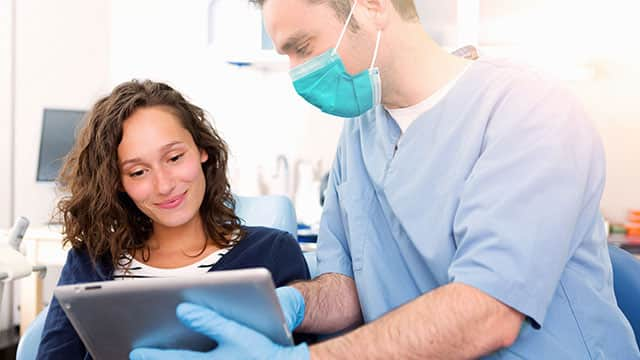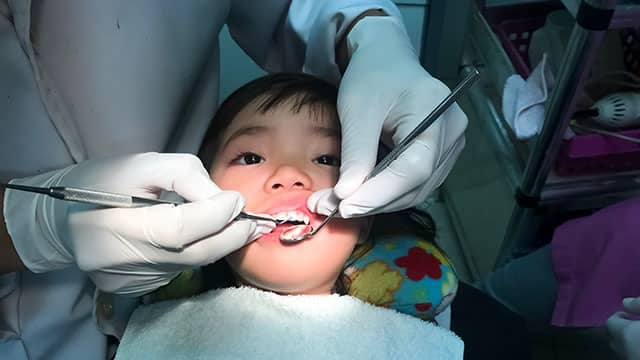A healthy oral care routine includes looking out for unusual bumps and persistent pains in and around the mouth, lips, tongue, and throat. Though the probability of being diagnosed with oral cancer is low, identifying the early signs of mouth cancer can increase your chances of successful treatment.
The American Cancer Society (ACS) estimates that 53,260 people in the United States will be diagnosed with oral cavity or oropharyngeal cancer in 2020. That's less than 0.02 percent of the population. And of those diagnosed, five-year relative survival rates vary between 52 - 90 percent depending on the location of cancer in the mouth.
Recognize the early warning signs of oral cancer and understand what activities put you at higher risk so that you can be prepared to act quickly if the need arises.
What Are The Early Signs and Symptoms of Mouth Cancer?
Mouth cancer can occur anywhere in the mouth, including the lips, tongue, and throat, as well as the salivary glands, pharynx, larynx, and sinuses. From burning your mouth on that too-hot piece of pizza to accidentally biting your tongue, your oral cavity can undergo a lot of wear and tear. However, these kinds of trauma should usually heal within 7 to 14 days. Because early detection is crucial in overcoming this disease, you'll want to visit your dentist immediately if any of the following symptoms persist for more than two weeks.
- Sores, swellings, lumps, or thick patches anywhere in or around your mouth or throat
- Areas of red and white lesions in your mouth or lips
- The feeling of a lump or distraction stuck in your throat
- Swelling that makes wearing dentures uncomfortable
- Numbness, pain, or tenderness anywhere in your mouth, including your tongue
- Pain in your ears without any loss of hearing
- Trouble moving your jaw or tongue and difficulty swallowing or speaking
- Loose teeth with no apparent dental cause
- Lingering sore throat or hoarseness
What Are The Causes and Risk Factors for Mouth Cancer?
Although oral cancer's exact cause is unclear, certain lifestyle factors can put someone at risk for this disease. Some of these factors cannot be changed. For example, most oral cancer patients are older than 55 because the disease takes years to develop. However, others are related to personal choices, and lifestyle changes may help decrease a person's risk.
Tobacco use
A majority of people with oral cancers use tobacco, and the risk increases depending on how long they have used it. According to the ACS, tobacco chemicals can damage the cells lining your mouth and throat, and some can even damage the cell DNA directly.
Alcohol use
According to the ACS, about 7 out of 10 patients with oral cancer are heavy drinkers, and the risk of developing oral cancer is as much as 100 times higher if a person is a heavy drinker and smoker than the risk for someone who does not drink or smoke.
Human papillomavirus (HPV)
Certain types of sexually-transmitted diseases can cause cancers of the mouth and throat. Most people with HPV infections of the mouth and throat have no symptoms, and only a tiny percentage develop oral cancer. The type linked to throat cancer is HPV16.
Sun exposure
Lip cancer tends to be more common in people exposed to ultraviolet (UV) light for long periods. People who spend a lot of time outdoors should take steps to protect their lips and all other exposed skin.
Oral Cancer Screenings and Treatments
Unlike other parts of your body, it's not easy to self-examine your mouth and throat. You'll need a mirror and proper lighting to see the surfaces of your mouth, and even then, many places won't be visible.
The good news is that your dentist and dental hygienist are trained to perform screenings for oral cancer. These examinations are quick, painless, and crucial to detecting the early stages of the disease. If you have recognized any of the early signs of oral cancer listed above, schedule an appointment with your dental professional. For the screening, he or she may use special lighting equipment to visually inspect the neck and inside of the mouth, an oral cancer screening device, or a mouth rinse or stain to locate abnormal tissue. Dental x-rays can also help identify any risk of mouth cancer.
Suppose abnormal tissue is detected in your mouth. In that case, a biopsy may be conducted by surgically removing all or part of the abnormal tissue and sending it to a pathologist for evaluation. The pathologist will look for cancerous cells in your oral tissue. With a definite diagnosis, your dentist or dental specialist will put together a treatment plan. Depending on the location and severity, this might include surgery, radiation, or chemotherapy.
Oral Cancer Prevention
When in doubt, seek prevention! You should already practice daily oral hygiene to prevent tooth decay and gum disease, such as brushing regularly with fluoride toothpaste, flossing daily, and limiting sweets. And by regulating certain lifestyle choices — smoking, alcohol use, and sun exposure, for example — you can lower your risk of developing oral cancer. Ultimately, if you know what to look for and see your dental hygienist for regular screenings, you can identify mouth cancer symptoms early and increase your chances for successful treatment.
This article is intended to promote understanding of and knowledge about general oral health topics. It is not intended to be a substitute for professional advice, diagnosis or treatment. Always seek the advice of your dentist or other qualified healthcare provider with any questions you may have regarding a medical condition or treatment.
ORAL HEALTH QUIZ
What's behind your smile?
Take our Oral Health assessment to get the most from your oral care routine
ORAL HEALTH QUIZ
What's behind your smile?
Take our Oral Health assessment to get the most from your oral care routine















